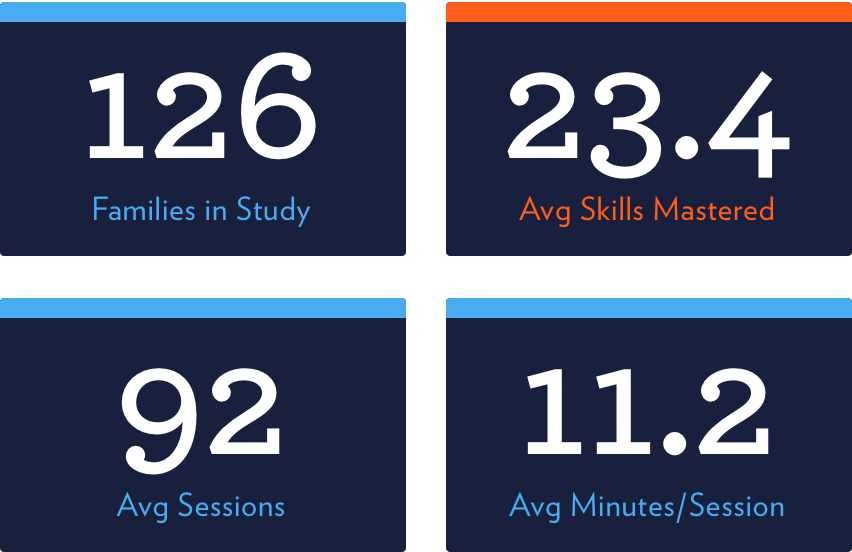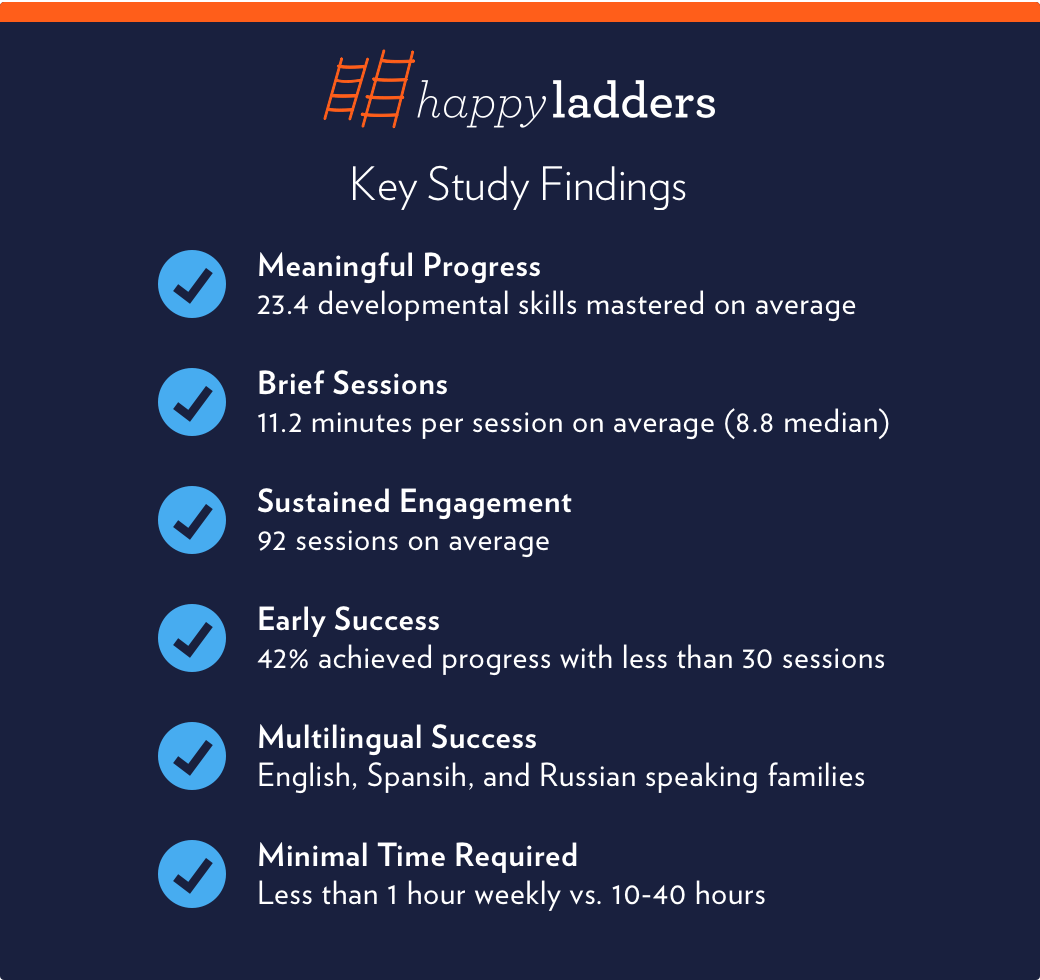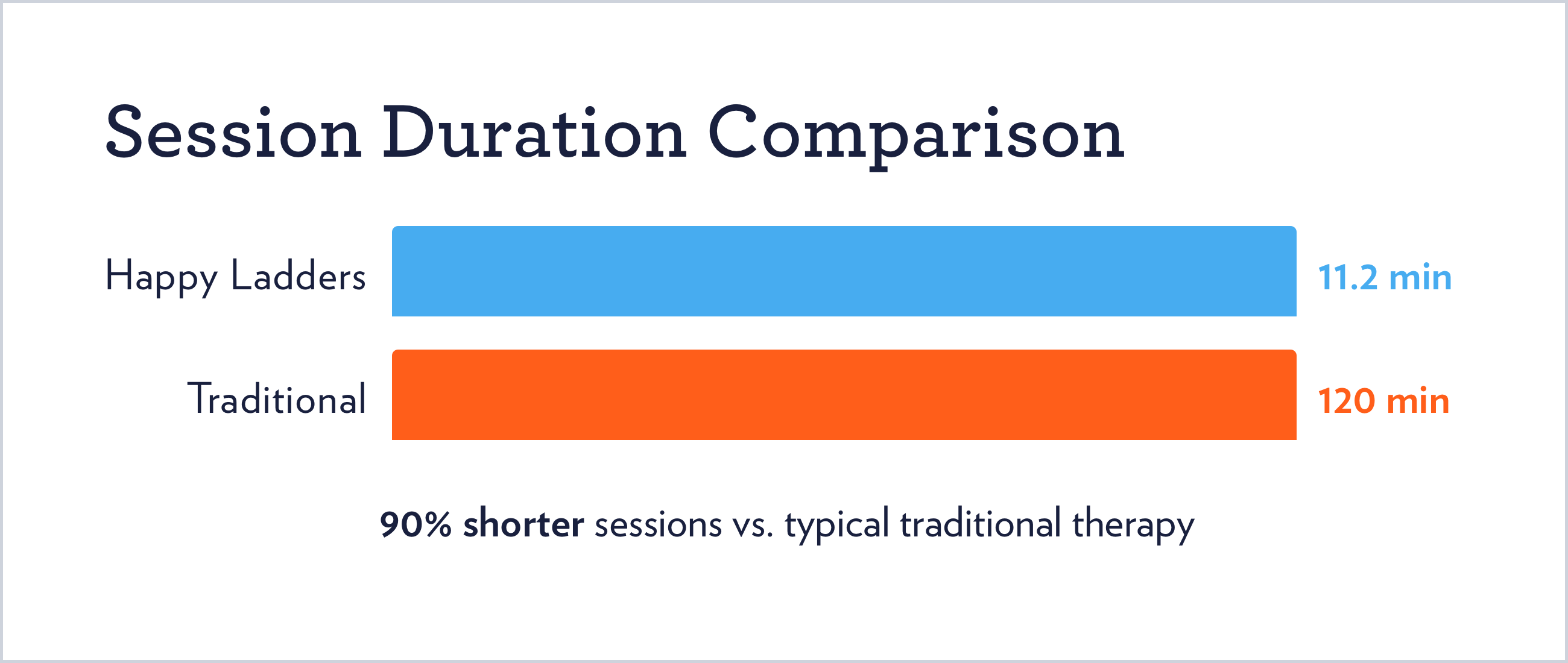Research challenges assumption that effective early intervention requires intensive clinical appointments, offers potential solution for families facing months-long waitlists
Study Findings: Brief Sessions, Meaningful Outcomes
The longitudinal study tracked 126 children whose families implemented structured parent-led intervention with professional guidance:
Key Results:
- 23.4 developmental skills mastered on average per child from a comprehensive skill curriculum spanning communication, play, self-help, and social skills
- 92 activity sessions completed on average over the two-year period, demonstrating sustained family engagement
- 11.2 minutes average session duration (median: 8.8 minutes)—compared to traditional 1-3 hour therapist appointments
- Flexible engagement accommodated diverse family circumstances, with meaningful progress across all participation levels
- Multilingual success across English, Spanish, and Russian-speaking families
Families achieved these outcomes through less than 1 hour weekly—a fraction of the 10-40 hours weekly required by traditional intensive programs that can cost $40,000-$60,000 annually.
"These findings suggest families can achieve meaningful developmental progress when equipped with structured guidance and flexible tools that fit their real lives," explains Amy Jacobs-Schroeder, Happy Ladders co-founder and early childhood development professional with 30 years of experience. "The sustainable session duration—just over 11 minutes—demonstrates that intervention doesn't require hours of intensive therapy to be effective. Parents are powerful agents of change when given the right support."
The study reinforces growing research evidence supporting parent-mediated intervention approaches. Recent comparative research by Sneed and Samelson (2022) found that parent-led applied behavior analysis significantly increased parental self-efficacy, while practitioner-led approaches showed no improvement in parental self-efficacy over six months.
From Clinical Frustration to Family Empowerment
After years of therapist-led intervention, parents felt unprepared to support their child's ongoing development when services ended.
"We have not served these parents one bit," Amy realized. "We have been working in a room separate from them for the last two or three years while they went and lived their lives. And then we're saying, 'Hey, here's your kid.'"
That moment changed everything. Amy recognized the problem wasn't parent resistance to independence—it was that the early intervention system had failed to equip parents from day one.
"I really started to look at that like at what point did we fail them? And I feel like we failed them in the very beginning," Amy reflects. "Through Happy Ladders and my work over the last 18 years, I've really looked to fix that issue right at the get-go."
Pioneering Parent-Led Intervention: The Square One Foundation
Amy's commitment to parent empowerment began years before Happy Ladders. As co-founder of Square One Autism Services, she pioneered parent-led intervention approaches through in-home services, demonstrating that families could be effective primary interventionists with proper professional guidance.
Lindsey Sneed, Vice President of Clinical Excellence at Catalight Foundation, describing the foundation's vendor network performance data:
"There was one provider in our network who consistently had the best outcomes, the shortest length of stays, and the highest satisfaction. And they were the only provider in our network that provided [Parent mediated interventions]."
That provider was Square One.
The evidence was compelling enough that Catalight Foundation shifted their entire vendor network toward parent-led intervention models based on Square One's superior performance. Happy Ladders represents the evolution of this pioneering work—transforming successful in-home parent coaching into a scalable platform that can reach any family, anywhere, immediately.
Source: Lindsey Sneed, Vice President of Clinical Excellence, Catalight Foundation, Rad N Bad Podcast Episode 11: "Who The Hell Is That? - The Truth About Parent-Mediated Intervention," September 3, 2025
The Platform: Immediate Access, Natural Implementation
Happy Ladders provides families with structured developmental activities they can implement during natural moments—play time, meals, daily routines—rather than requiring in-home or clinic-based services.
The platform offers:
- Comprehensive skill curriculum across four developmental domains (Communication, Play, Self-Help, and Community & Coping)
- Personalized Therapy Plan based on child developmental assessments
- Real-time progress tracking enabling families to monitor skill mastery
- Live professional support through weekly office hours
- Multi-caregiver access allowing parents, grandparents, or other service providers to participate
- Multilingual support in English, Spanish, and Russian
Unlike traditional services requiring waitlists and appointment scheduling, families can begin intervention immediately.
"We're working with a lot of families in rural areas of California who can't get therapy services—they only have one car and the other parent's taking that to work," Amy explains. "When service coordinators refer families to us, the family can get access that same day. They can start therapy that night and start running these play-based activities at dinner time or bedtime or bath time."
Real-World Success: Cheryl's Story
Cheryl H., a full-time working parent, represents the 42% of study families who achieved meaningful progress through flexible engagement when traditional in-home services weren't an option.
After a year with Happy Ladders:
"Thank you Amy for the support the past year. My son has made so much progress. I'd highly recommend for parents to have access to all these resources."
Cheryl's experience demonstrates how accessible intervention can work for families facing real-world constraints—achieving developmental progress without disrupting work schedules or requiring appointment coordination.
Addressing the Access Crisis
The findings have implications for addressing documented capacity limitations in traditional early intervention service delivery:
- Waitlists creating 3-6 month delays between referral and service initiation during critical development periods
- Provider shortages in rural and underserved areas leaving families without local access
- Geographic barriers with families living outside serviceable areas
- Language and cultural barriers limiting access for diverse families
- Inflexible scheduling requiring time off work or coordinating with provider availability
- Limited service hours that don't match family availability, particularly for working parents
Parent-led approaches complement rather than replace traditional services, creating therapeutic opportunities between professional visits and empowering families with tools for everyday implementation.
Current Impact and Expansion
Happy Ladders currently serves families through partnerships with five California Regional Centers—nonprofit agencies that coordinate and fund developmental services—demonstrating the platform's effectiveness within established early intervention systems. As evidence from the 126-family study validates the approach, Amy and her team are expanding partnerships with early intervention organizations nationwide.
"We're not trying to replace existing services," Amy explains. "We're creating new pathways for families to access support, whether that's through regional centers, school districts, healthcare systems, or community organizations. The goal is ensuring every family has access to the tools they need, when they need them."
Study Limitations and Research Needs
This observational study analyzed parent-reported outcomes from families implementing structured parent-led intervention. While findings suggest potential value, significant methodological limitations warrant careful interpretation:
Study Limitations:
- Parent-reported outcomes only (no independent clinical assessment)
- Observational design (no control group for comparison)
- Potential selection bias (families choosing the platform may differ from general population)
- No safety monitoring or systematic adverse event tracking
What This Means: Controlled studies with independent assessment, appropriate comparison groups, and systematic monitoring are needed to establish comparative effectiveness and validate these preliminary findings.
About Happy Ladders
Happy Ladders is a mobile early intervention platform founded by Amy Jacobs-Schroeder, early childhood development professional with 30 years of experience, to address the fundamental gap in parent preparation within traditional early intervention services. Currently partnering with five California Regional Centers and expanding to collaborate with early intervention organizations nationwide, the platform empowers parents of children ages 0-5 to address developmental needs through parent-led therapy in natural environments.
The platform serves families with children facing various developmental challenges, providing structured activities that support communication, play, self-help, and social skills regardless of specific diagnosis or developmental concern.
Important: Happy Ladders is a mobile health platform for parent-led developmental support. It is not a medical device and does not diagnose, treat, or cure any medical condition. Parents should consult with qualified healthcare professionals regarding their child's developmental needs and treatment plans.
Media Contact
Amy Jacobs-Schroeder
Co-Founder, Happy Ladders
info@happyladders.com
happyladders.com
Partnership Inquiries: info@happyladders.com
Study Information: happyladders.com/study-2025
Note to Editors: Interviews with Amy Jacobs-Schroeder are available upon request. Amy can discuss her journey from clinical frustration to platform creation, the parent preparation gap in early intervention, Square One's pioneering parent-led model, and practical strategies for empowering families.





